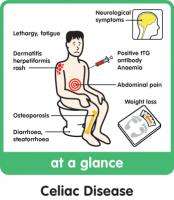Friday, June 21, 2013
Why Self-Diagnosis of Celiac Disease Can Be Harmful
I have been researching various websites on the topic of Celiac Disease. A majority of these websites have forums, where readers can comment on what they have read. Some of the comments I have read are pretty disturbing. There have been people who state that they feel sick after eating bread, or anything else with gluten in it. Then they say that they may have Celiac Disease, and instead of going to the doctor, they put themselves on a gluten free diet, and automatically feel better. Then, they try eating food with gluten in it, and then get sick. Now they're convinced they have Celiac Disease. They go back on the gluten free diet, and stay on it.
I have a serious problem with people who self-diagnose themselves with Celiac Disease. For one thing, if you suspect you have Celiac, you need to go to the doctor, BEFORE going on a gluten free diet. Here's the reason why: The doctor will order a blood test, and a biopsy, to see if you do have Celiac. If you begin eating gluten free food, before these tests, Celiac Disease will NOT show up on the blood test and biopsy. You are only screwing yourselves if you diagnose yourself as Celiac. Only the doctor can diagnose you. Celiac is a serious illness, and should not be messed with. Trust me, you don't want to suffer the consequences of not being properly diagnosed.
I was diagnosed "very positive" with Celiac Disease. I went YEARS experiencing symptoms. I was diagnosed with Irritable Bowel Syndrome (IBS) when I was very young, and I later found out that Celiac is always mistaken with IBS. I should have been tested for Celiac when I was 11 years of age. However, back then, Celiac Disease was extremely rare, and gluten free food was impossible to find.
Last year, I had an endoscopy and colonoscopy. Despite being gluten free since 2011, my biopsy still showed Celiac Disease damage. That is what happens when you go years without being properly diagnosed.
Like I said, if you suspect that you have Celiac, or an allergy to gluten, make an appointment with your doctor BEFORE going gluten free. As soon as you have symptoms of intolerance, talk to your doctor. The earlier you are diagnosed, the easier it is to heal the small intestine.
(photo courtesy of: http://www.celiac.com/content_images/celiac_disease_symptoms_thumb.jpg)
Connecticut mom making waves with her gluten-free macaroons.
If you are gluten free and from CT (like I am), you will be delighted by this story. A mom in Enfield looked for a way to work and be a s...

-
If any of you are in the NYC area on May 19, you have to check out a comedy show being sponsored by the Celiac Disease Foundation. Tickets...
-
On Thursday, the US House Committee on Appropriations Subcommittee on Labor, Health and Human Services, Education and Related Agencies rel...
-
Celiac Disease awareness is near and dear to my heart, and it is important that we continue to raise awareness in hopes it helps the rest ...



